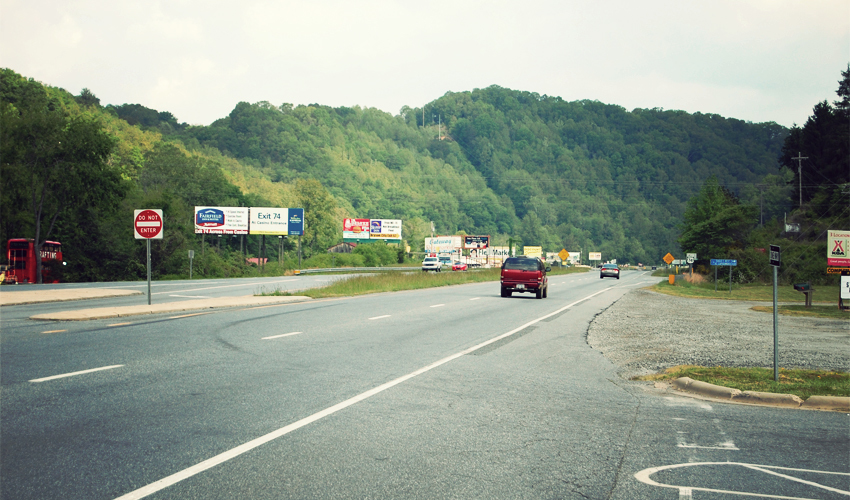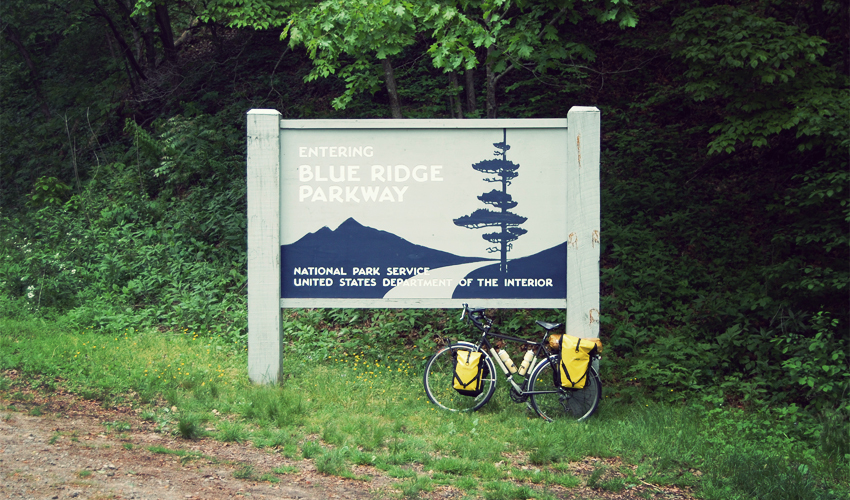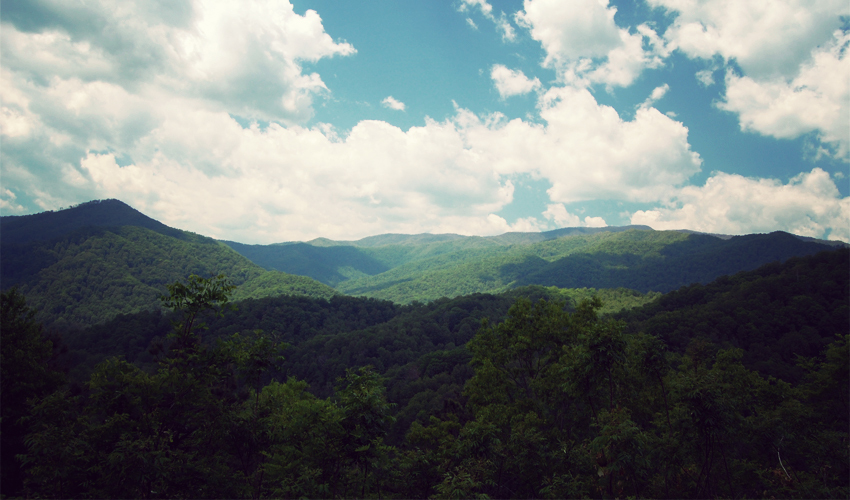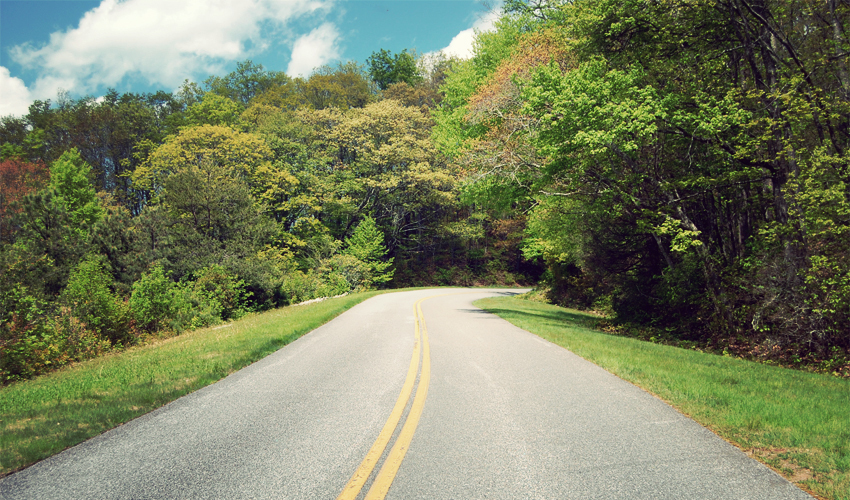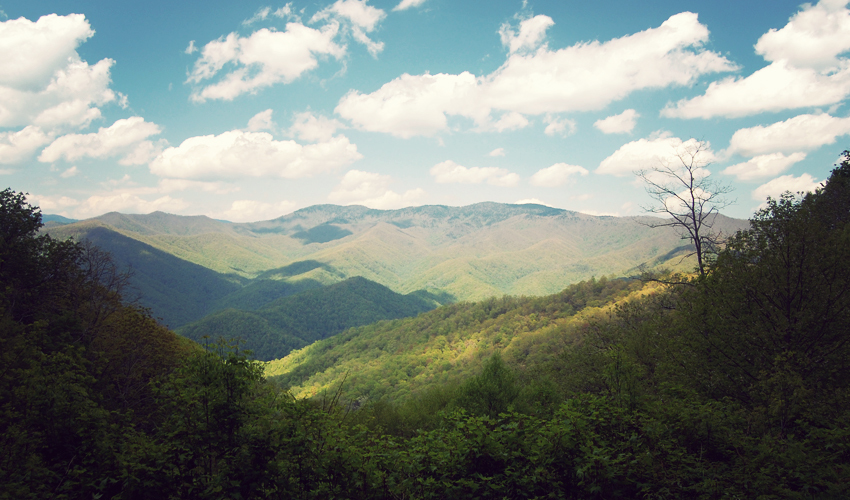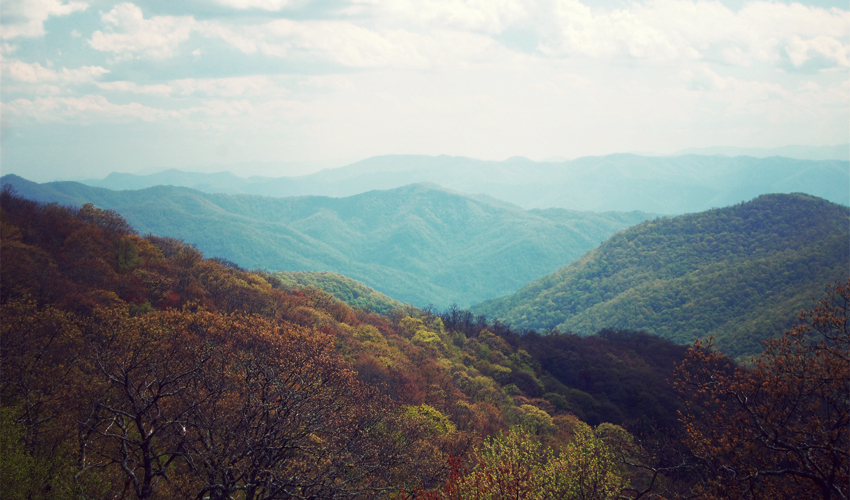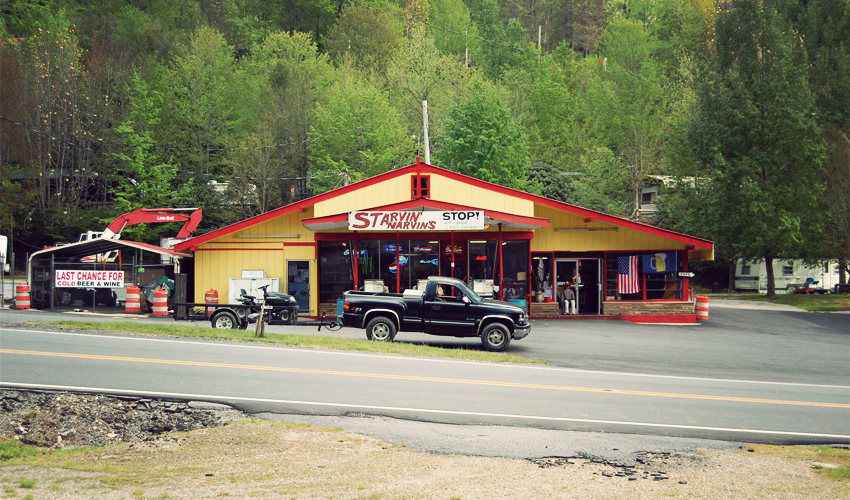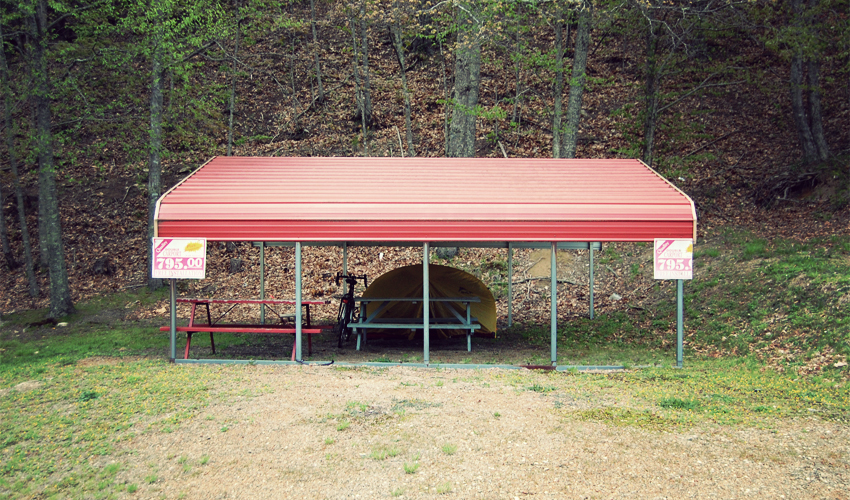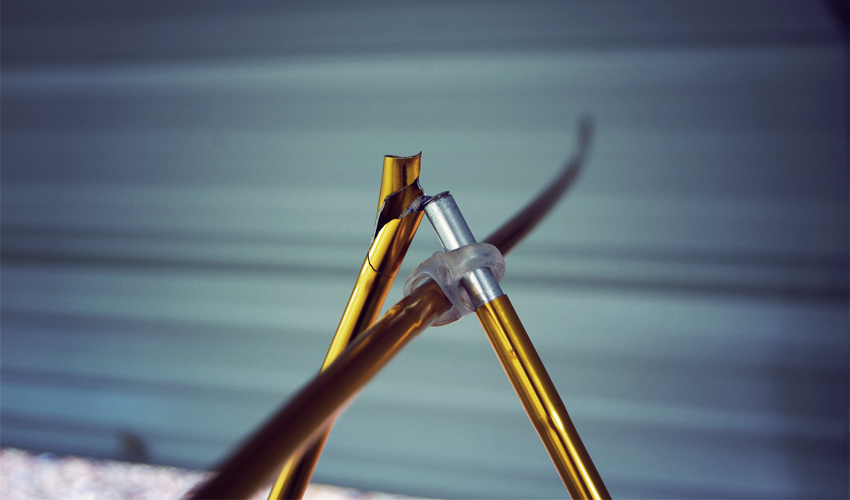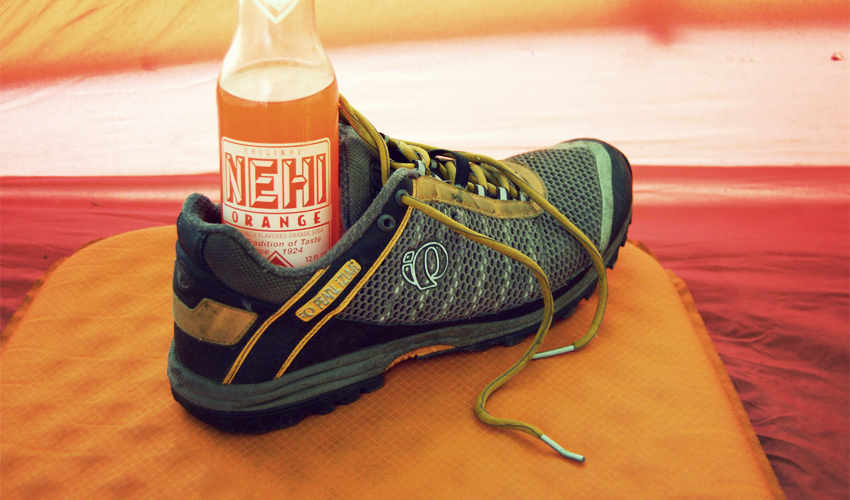May 8, 2011
Day 26: Near Tuckasegee, NC to near Maggie Valley, NC
The rain starts as I pack up, but stops before I head out. In the 25 days since leaving Key West I've had to ride in the rain for exactly five minutes, back in the southern end of Georgia. I cash in yesterday's hard work and fly down four huge hills, through big, sweeping curves, and smaller, tighter turns, all at better than 30 miles per hour. I freeze in the cold morning air and the drop shoots me out into a river valley.
The highway winds along the river as it heads north and past the campus of Western Carolina University, home of the Catamounts. The hills and mountains that stand watch over all sides of the valley are stunningly beautiful, covered top to bottom in trees of brown and yellow and a hundred different shades of green. My legs still ache from yesterday and I ride ridiculously slow on the tiny hills all morning.

| Heart | 1 | Comment | 0 | Link |
On a quiet back road I pass old guys that fish in waders and stand ass-deep in the freezing water. A group of pale tourists listen to instructions on kayaking the rapids, something that every single one of them looks totally unprepared for. The river continues to go down, the mountains loom high above, and all I can think about are the painful ways I'm going to pay for this easy riding later.
I coast down to the reservation town of Cherokee and into a mess of Waffle Houses, McDonalds, Arbys, Taco Bells, Pizza Huts, and vaguely native-sounding places like the Pocahontas Motel and the Inn of the Seven Clans. Bugs swarm all over if I stop even for ten seconds. Not far up the road I pass the As Seen on TV Superstore, where tourists can buy a Slap Chop or a Shamwow for a premium. The shop next door pays cash for gold. A huge Harrah's casino sits directly across the street. It's a magical place.
Still, it makes sense to stop here. I can take a shower, rest my tired legs, load up on carbs, catch up on the journal, and wake up ready to tackle the start of the Blue Ridge Parkway in the morning instead of the afternoon heat and sunshine of today.
But I don't stop. I'm not sure where it comes from. Maybe I'm drunk off the three huge plates worth of biscuits, gravy, french toast sticks, and bacon I just blew through at the breakfast buffet. Maybe the stuffed bison head attached to the wall above my table at the restaurant spoke to me. Whatever the reason, I keep riding.
The main part of Cherokee is a disaster, the highway lined on both sides with souvenir stores, ice cream shops, fast food places, mechanical bull riding, mini-golf, and fourteen other kinds of businesses designed to separate tourists from their money. Halfway through town I pass a native man, probably in his late 40s, standing off to the side of a small stage about 40 feet from the road. He wears a dirty white t-shirt along with a feathered headdress, brownish pants, and boots with short strips of leather hanging off the sides like tassels. He sits all by himself, smoking, waiting for a carload of tourists to come along, plop out of their car, and put down $20 or $30. Then he'll dance for them. I can't decide what's more sad: that he has to do this to make a living, or that the people who pay to watch think it's an authentic experience.
I stop at a mini-mart, load up on water and food, spray on a gallon of sunscreen, and then I'm off, out of the wild mess of Cherokee and into the woods. Everything I've read about the start at the south end of the Blue Ridge Parkway says that it's a seriously difficult, steep climb that doesn't level out even a bit for the first ten miles, where it rises more than 3,000 feet. I'm mentally prepared for the toughest riding of my life. But as soon as I start I'm surprised; it's not nearly as awful as I expected. It's a very challenging climb, but the steep sections from yesterday were much worse. I drop into the smallest gear and slowly pull my way up along winding roads, mostly shaded by the trees that closely line both sides.
I sweat constantly. It pours down my neck, my back, and all sides of my legs. When my tongue touches the area around my mouth, all I taste is salt. Any time my head points down, huge white drops fall off my forehead and chin and stain the top tube. It's a Sunday, Mother's Day, and few cars pass. Most are from out of state—Ohio, Indiana, Georgia, Tennessee, New Jersey. My adrenaline pumps, my legs don't feel sore anymore, and I'm in a good rhythm, happy I decided to make a go of it.
Vans and SUVs pull into the paved overlooks that cut off a hundred feet from the Parkway. They stop, take one picture or skim over a boring placard about the history of the area—never getting out of the car, ever—and then speed off 20 seconds later, their need to experience nature satisfied for another half hour or until they have to piss. They miss out on an incredible show. The vistas of the rolling hills, valleys, lakes, and towns below are absolutely stunning, especially as the road winds higher and starts to become more and more even with the tops of the nearby mountains.
The hardest part of the afternoon isn't the climb—it's the bugs. Within five seconds of stopping, every single time, at any elevation, black gnats surround me. They fly into my nose and my ears. They get caught up in my eyelashes. They land all over my neck and arms and legs. As I work harder, the sunscreen I put on back in Cherokee congeals in white, sweaty, salty clumps on the surface of my skin. The bugs catch themselves up in that mess, too. It looks and smells and feels every bit as wonderful as it sounds.
I forget about all of it when I top out at 5,200 feet and start down. The descent is pure joy.
I drop half a mile off the Parkway and pull into Starvin' Marvin's convenience store. It's painted yellow with bright red trim and the front window is covered with signs like "Protected by a pit bull with AIDES" and "We shoot every third salesman—and the second just left." Back in Toccoa, Bob let me borrow a guidebook that lists all of the services along the Blue Ridge Parkway. Written in 2004, it says that the place offers tent camping. I ask the heavy native woman behind the counter if they still allow people to camp across the street. I get only a confused look in response.
Starvin' Marvin himself sits a few feet away. He's also native, in his 60s, wears thick-rimmed glasses and a trucker hat, and has the slightest hint of a cleft palate below the right side of his nose.
"No, we never done that," he tells me, although he seems like the kind of guy who could have told some goofball guidebook author seven years ago that his place offers camping and then forgotten all about it.
I tell him I'm on a bike, that I just want to stay for the night, and that I'll be gone early in the morning.
"Hey, if you wanna, I guess you can," he says. "You can set up anywhere over there, even under the cover if you want."
Sweet.
"If anyone gives you trouble, just tell 'em you part of the Sutton family."
I guess I'm part Cherokee tonight.
"Although," he adds, "You never gonna catch one of us ridin' a bike up these hills."
I stock up on water and food and set up under the aluminum cover across the way. It's a hundred feet from a busy, noisy state highway, but unlike every other campground nearby it's open and it's free. There aren't any bugs, either. That turns out to be important, because as I set up the tent I hear a snap when the top of the longest section of the poles cracks apart, leaving the connection point a mess of sharp and twisted aluminum. At first I think I'm hosed, but soon realize I can flip the poles over and force them to hold loosely in place well enough to clip in the supporting poles and straps. I cover the ragged edges of the break with duct tape to keep them from tearing the rain cover.
I spend the evening thinking about the second critical piece of gear I now need to replace as traffic on the highway screams past.
Today's ride: 55 miles (89 km)
Total: 1,361 miles (2,190 km)
| Rate this entry's writing | Heart | 2 |
| Comment on this entry | Comment | 0 |
